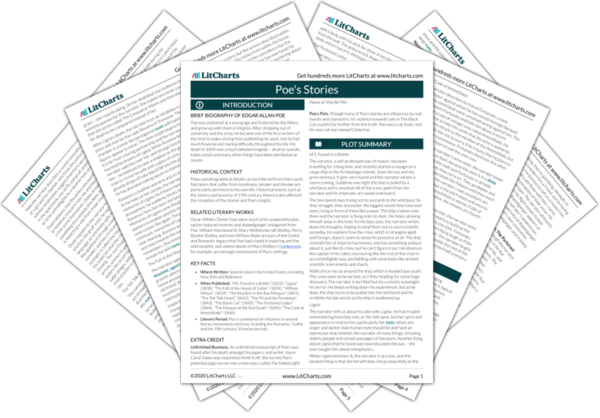Many of Poe’s narrators tell stories that have already happened. Often, the difference between the situation of the narrator now, and the narrator then, is profound. For example, the narrator of The Black Cat begins what seems to be a domestic story about his pets, but it soon becomes clear that, as a result of the events of the story, the narrator is now in jail. This forewarning of the consequences of the tale provides the story much of its suspense. But a symptom of this voice of hindsight is a kind of unreliability. When we, as readers, know that the character talking is now in jail, for example, it raises the question of whether the narrator might be either hiding some aspect of the story or whether the traumatic events that led to the narrator's incarceration might have warped the narrator's memory of his own experience.
Stories like William Wilson begin their remembering with a description of the narrator’s childhood self. Through the lens of adulthood, childhood selves become tainted with Freudian implications and seem less than innocent. Many of the descriptions of children seem to mirror what Poe himself was like a child—intelligent and overactive and dominant—but they also portray childhood as including an awareness of violence that doesn’t seem to belong in a child’s world. Viewing childhood in this way, infused with the subsequent psychological deviance of the adult character, produces a version of events that can be deceptive and unclear.
Drugs and alcohol further cloud the reliability of memory. It is mentioned several times, though never explicitly blamed for any of the narrators’ troubles, that there is a lot of alcohol drinking and opium taking surrounding the events of the stories, suggesting that the narrator may be under the influence not just of madness but also inebriation, making it impossible for us, as readers, to trust even an interior monologue.
The Power of Memory ThemeTracker

The Power of Memory Quotes in Poe's Stories
The night waned; and still, with a bosom full of bitter thoughts of the one only and supremely beloved, I remained gazing upon the body of Rowena.

Unlock explanations and citation info for this and every other Poe's Stories quote.
Plus so much more...
Get LitCharts A+Let me call myself, for the present, William Wilson. The fair page now lying before me need not be sullied with my real appellation. This has been already too much an object for the scorn – for the horror – for the detestation of my race.
I must not only punish but punish with impunity. A wrong is unredressed when retribution overtakes its redresser. It is equally unredressed when the avenger fails to make himself felt as such to him who has done the wrong.











